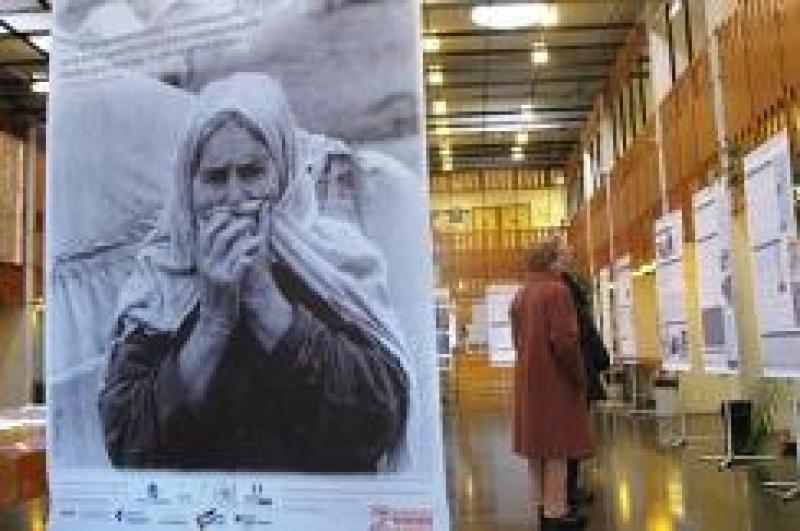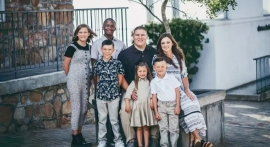

WCC exhibition
Experiences of death and expulsion faced by some 750,000 Palestinians in 1948 are the subject of an exhibition titled "The Nakba" and hosted by the World Council of Churches (WCC) at the Ecumenical Centre in Geneva, Switzerland. The Arabic word Nakbameans "catastrophe."
Organized by the Collectif Urgence Palestine, a Swiss organization, the "Nakba" exhibition displays maps, statistical tables, illustrations of projects and images reflecting the violent history of Palestine between 1947 and 1949. The display is complemented by another one titled "Witnesses," prepared by the Entraide Protestante Suisse (EPER) and Peace Watch Switzerland, two Swiss partner organizations of the WCC Ecumenical Accompaniment Programme in Palestine and Israel (EAPPI).
"Witnesses" highlighted the reality of the on-going conflict in Israel Palestine through personal stories of Swiss ecumenical accompaniers. The WCC EAPPI programme was launched in 2002 as a response to a call from local churches to the ecumenical family to come, witness and accompany both Palestinians and Israelis in their daily peaceful resistance to occupation.
A two-day conference entitled "From the Nakba to the Kairos Palestine document: From Despair to Hope" was held along with the exhibitions. The speakers at the conference were Nora Carmi, project coordinator of Kairos Palestine; Riccardo Bocco, professor of political sociology at the Graduate Institute of International and Development Studies in Geneva; Majed Bamya, first secretary at the Ministry of Foreign Affairs, Ramallah; Jean Feyder, former ambassador of Luxembourg to the United Nations; and Afif Safieh, former ambassador of Palestine in Washington and Moscow.
"Nakba marks a brutal reality that most of the world ignored as Palestinians languished in crowded camps throughout the Middle East over the years," said Rev. Dr Olav Fykse Tveit, WCC general secretary, in his written message for the conference. The number of Palestinian refugees is said to be over 6.5 million.
"The brutal story of dispossession continues to this day, exemplified by the expansion of settlements with more than 550,000 illegal Israeli settlers in occupied territory," he said.
Tveit called the exhibition a remembrance of the history and reality of the Palestinians under occupation. He said sharing of such historical facts is an "attempt to say the truth in love, so that the world will find real solutions that lead to peace and justice."
Calling occupation of Palestine "a sin," Nora Carmi spoke about the Kairos Palestine document issued by Palestinian Christian leaders in 2009. The document offers a vision for how Christians can raise their voice against the occupation. The document, Carmi said, offers "hope in a hopeless situation, offering a word of faith and love amidst despair."
Understanding the Palestinian situation
Prof Riccardo Bocco presented a brief overview of the different historical paths of Palestinians and of Eastern European Jews to enable a better understanding of the current situation in Palestine and Israel. "The desire of certain Jews to establish a Jewish state-nation emanated from their lives during five centuries in Europe where they were mostly excluded from a national identity," he said.
Bocco went on to say that the creation of the state of Israel was seen as compensation for the many centuries of suffering of the Jewish people - especially the atrocities of the Second World War. However, that reparation for past victims created new Palestinian victims.
Majed Bamya, who joined the conference through video conference, said "if nonviolent means of resistance are available to the oppressed, they will not choose violent means to resist." He said, "Palestinians have the right to go back to their homes, access and recognition as a nation."
Bamya stressed that the international community must support movements for peace and freedom in solidarity with the Palestinians, who are losing bits of their homeland every day. He said the "world must understand the long history of Israeli oppression." A large number of Palestinians are still living in Israeli jails forgotten by the world, said Bamya.
Jean Feyder spoke at the event about the responsibility of the United States and some countries in the European Union, which he said must stop military cooperation and arms trade with Israel. He said cooperation in trade of weapons and technical support to Israel in the long run violates international law by triggering violation of human rights in the region.
Afif Safieh urged the international community to send an "unambiguous message to what is expected of Israel, calling for sustainable peace." He mentioned boycotting of goods produced in the Israeli settlements on occupied Palestinian lands as one of the measures.
Safieh said that comparison of the Palestinian situation with other tragedies ends up trivializing the realities of people, adding to the lack of understanding about real issues. He also appreciated "the voices and courage from the churches in the United States, calling for peace in the region."
















